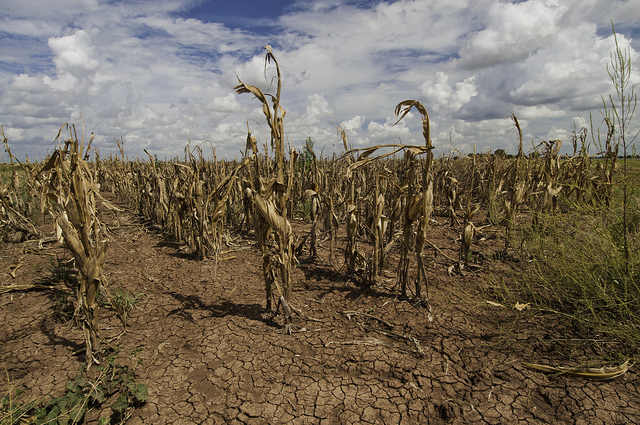Part 1 - Ethics in Systems Research

First, think about this scenario...
Let's say that, in a particular year, the climatic conditions in the U.S. produce significant droughts for certain regions in the Midwest. In this scenario, these severe droughts happen in regions that typically expect a significant amount of rainfall every year to support the extensive growth of corn. This lack of rainfall causes a near-complete failure of the corn crops in the region, which grows the most corn per unit area in the world. This failure of crops leads to increased prices in corn products and other foods that use corn as feed (chicken, beef, even fish). But this drought also leads to a sudden jump in price because corn is used as the main feedstock for brewing most of the ethanol that goes into our gas tanks ("up to 10% ethanol per gallon"). Now, let's think about how this impacts prices at the pump and at the grocery store. Prices per gallon or per pound go up for everyone that buys these products. However, if we consider the increase in cost to the consumer is, say, an increase of $1.00 per gallon or pound, that $1.00 per gallon or pound is four times the percentage of someone's income that makes $30,000 per year than it is for someone that makes $120,000 per year. Also, as a result of the drought, the price of the white corn that is used to make tortillas, a main food staple in Mexico, goes up. The white corn crop might not even be impacted by the drought, but because the price of white corn is tied to the price of yellow corn, used to feed livestock and brew biofuels, the price of this common food staple also goes up.
Having considered this scenario, what do you think about it? Is there something here we can describe as a better or worse decision about using corn for ethanol? Is there something good or bad about food prices competing directly with fuel prices? These questions do not have simple answers.
Engaging complex systems
Engaging complex systems, whether they are tied to energy or environment, requires significant investigation and research support. This applies to engagement through politics and economics as well as it does with science and engineering.
The development of sustainability strategies and the technological and scientific research in the support and pursuit of renewable energy require rational and well thought through processes of evaluation. These well thought through processes of evaluation form a basis of research practice that is common to both engineering and science. Complex systems also often require multidisciplinary approaches to addressing a variety of questions and concerns, usually towards a framework of problem-solving. While one might not be engaged specifically in the scientific aspects of a complex system, the need for research and further discovery is needed in engineering, economics, policymaking, intellectual property, ecology, etc. For the purposes of this module series, we consider anyone conducting research into some aspect of complex systems to be engaged in "systems research." Further, whether one is conducting basic research on materials or looking at the global economic implications of sea level rise, one needs to be aware of the ethical dimensions of the systems they are researching. The modules of this series investigate various ethical issues that arise in the research of energy and environment systems.
Energy and Environment Systems affect Human Systems
Complex systems do not always imply environment or human systems, which implicitly require an ethical analysis and treatment. However, all of the modules in this series do involve some aspect of environmental systems and some aspect of energy systems. And energy systems, by their very definition, involve human systems.